Metallic BSDF¶
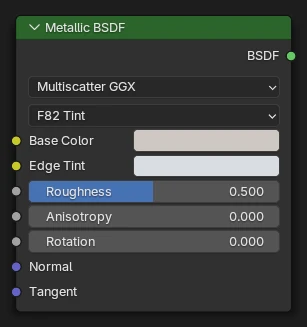
Le nœud Metallic BSDF est utilisé pour recréer l’apparence des métaux.
Inputs¶
F82 Tint¶
- Base Color
Couleur du matériau vu de face.
- Edge Tint
Couleur du matériau vu sous un angle de 82°.
Conducteur physique¶
- IOR
Indice de réfraction par canal de couleur. Il s’agit de la partie réelle d’un indice de réfraction complexe, noté scientifiquement n.
- Extinction
Coefficients d’extinction par canal de couleur. Il s’agit de la partie imaginaire d’un indice de réfraction complexe, noté scientifiquement k.
Common (Points communs)¶
- Roughness
Netteté de la réflexion ; parfaitement net à 0.0 et plus lisse avec des valeurs plus élevées.
- Anisotropy Cycles uniquement
Quantité d’anisotropie pour la réflexion spéculaire. Des valeurs élevées donnent des reflets allongés dans la direction de la tangente; des valeurs négatives donnent des reflets de forme perpendiculaire à la direction de la tangente.
- Rotation Cycles uniquement
Tourne la direction d’anisotropie, avec 1.0 signifiant cercle plein.
Comparé au nœud Glossy BSDF, la direction de l’allongement du reflet est tournée de 90%. Ajoutez 0.25 à la valeur à corriger.
- Normal
Normale utilisée pour l’ombrage ; si rien n’est connecté, la normale de l’ombrage par défaut est utilisée.
- Tangent
Tangente utilisée pour l’ombrage ; si rien n’est connecté, la tangente de l’ombrage par défaut est utilisée.
Properties¶
- Distribution
Distribution Microfacets à utiliser.
- GGX:
Distribution des microfacettes GGX.
- Multiscatter GGX:
Prend en compte les multiples évènements de diffusion entre les micro-facettes. Cela donne des résultats plus économes en énergie, qui autrement seraient visibles comme un assombrissement excessif.
- Beckmann:
Cycles uniquement Distribution des microfacettes Beckmann.
- Fresnel Type
Modèles permettant de décrire l’aspect du métal, en précisant la couleur apparente ou l’IOR physique.
- F82 Tint:
Utilise la Adobe F82-Tint formula pour le fresnel métallique. Cela permet un contrôle convivial de la couleur près du bord du matériau pour simuler un IOR complexe.
- Conducteur physique:
Accepte les mesures IOR complexes à partir de métaux réels pour reproduire un rendu des métaux plus précis que le type F82 Tint Fresnel.
Les valeurs IOR complexes peuvent être trouvées à partir de sources telles que Physically Based database for CG artists et Refractive Index nk database.
Outputs¶
- BSDF
Sortie Shader standard.
Exemples¶
F82 Tint¶
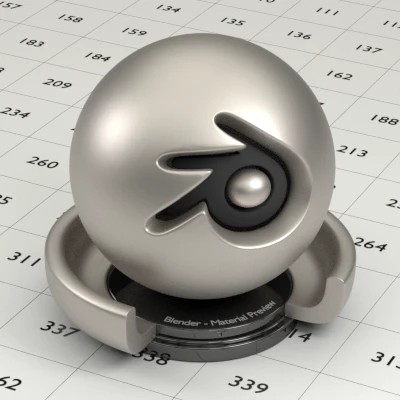
|

|
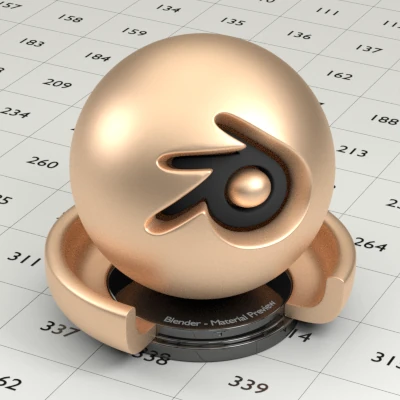
|
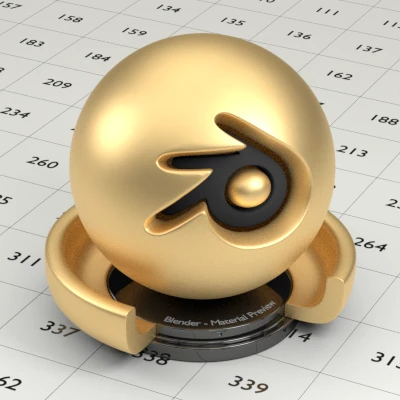
|
|
Material |
Titanium (Par défaut) |
Aluminum |
Copper (Cuivre) |
Gold (Or) |
Base Color |
0.617, 0.576, 0.540 |
0.911, 0.912, 0.917 |
0.972, 0.694, 0.486 |
1.000, 0.735, 0.353 |
Edge Tint |
0.695, 0.726, 0.770 |
0.848, 0.877, 0.916 |
0.961, 0.969, 0.942 |
0.993, 1.000, 1.000 |
Conducteur physique¶
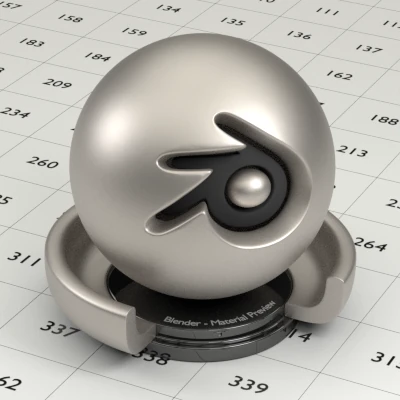
|

|
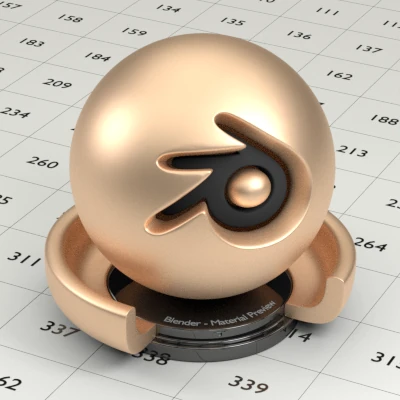
|

|
|
Material |
Titanium (Par défaut) |
Aluminum |
Copper (Cuivre) |
Gold (Or) |
IOR |
2.757, 2.512, 2.231 |
1.333, 0.945, 0.582 |
0.235, 0.729, 1.369 |
0.000, 0.470, 1.439 |
Extinction |
3.867, 3.404, 3.009 |
7.434, 6.340, 5.181 |
5.666, 2.562, 2.227 |
182.6, 2.189, 1.660 |